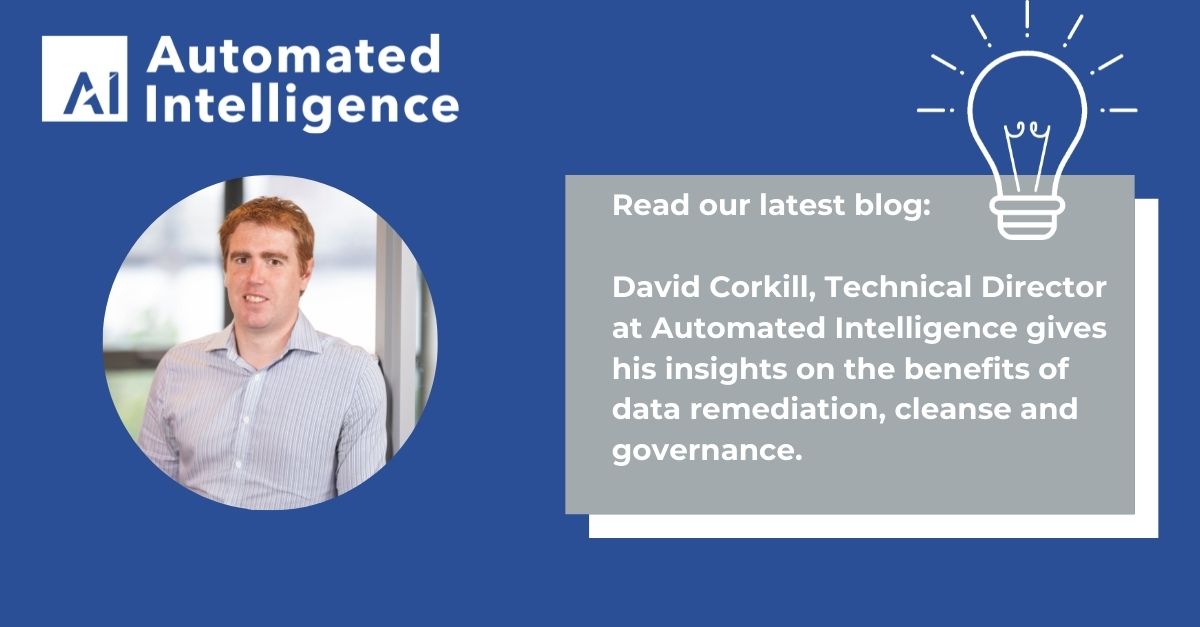Reading time: About 4 minutes

Data remediation is the process of cleansing, organising and migrating data to ensure it is fit for purpose and best serves its intended use. However, there is a misconception that data remediation is simply about removing the business data you no longer need. In fact, it’s the overall management of data and while this certainly might include cleaning up redundant or duplicate files, the process significantly relies much more on understanding your data to enable you to decide what you do with it. Whether this is deletion, organisation, categorisation or migration, it all forms part of the data remediation process.
In our latest blog, we discuss the importance of cleansing and remediating your data, including the typical challenges organisation’s often face, why it’s paramount to understand your data before-hand and the outcomes we see organisation’s benefiting from today. We speak to Automated Intelligence’s David Corkill, Technical Director, for his insights in this area.
Can you talk us through why it’s important to gain an understanding of your data before implementing data remediation, cleanse and governance processes?
Understanding your data is paramount, if you don’t know what data your estate holds, then you can’t decide what data needs cleansed, what needs to be kept or archived. Without that analysis, you can’t make informed business decisions on how your data estate should look moving forward. For example, a general rule may be to look at all files over a certain time period or age and apply a particular policy to it, however it doesn’t necessarily mean it should be applied to all data blindly. The analysis from understanding your data will help determine informed business decisions.
What are the typical challenges organisations often face when considering data remediation, cleanse and governance processes?
There are numerous challenges organisations often face. One of the main challenges we tend to see at Automated Intelligence focuses on the volume of data which can be overwhelming for organisations. The volume and velocity that data grows at is increasing at a vast rate, therefore businesses may often think, where do I start and how do I understand the profile of my data estate?
Similarly, another challenge organisations may experience is the difficulty in understanding different business functions and how policies can inflict them. If you look at an entire business function, no two departments are the same, neither are teams within those departments. HR will have different policies from Finance or from IT for example.
Another huge challenge we’ve identified is the lack of taking ownership and sign off for either deleting, migrating or archiving data throughout organisations. This derives from concerns over responsibility of data, what if files are deleted but are then required again in future? However, this relates back to making informed business decisions. If your organisation has the confidence and a good understanding of what data they hold, then obtaining sign off is much easier.
What in your experience, are the benefits organisations can achieve by implementing data remediation, cleanse and governance processes?
Organisations can achieve a range of benefits. These include:
- Reduction of storage costs, typically up to 70% of information will be remediated. Data cleansing also negates the need for additional expensive storage facilities.
- Increased productivity and decreased time spent searching for particular files from an end user point of view. Staff can easily and efficiently find and manage files ensuring increased confidence in the usefulness of data and improved efficiencies whether via direct cost savings or savings on users’ time.
- Users will be able to store key content centrally, data can be restored efficiently, and potential viruses or malware can be detected more effectively.
- Improved governance and security by removing data such as credit card information which minimises risk. Enables improved regulatory governance such as GDPR.
How Automated Intelligence can help.
At Automated Intelligence, our AI.DATALIFT solution can take control of your unstructured data, reduce risks, decrease storage costs and strengthen governance. AI.DATALIFT is a cloud-hosted, secure platform that enables organisations to catalogue valuable information assets, provide full discovery, categorisation, retention and defensible disposition to effectively remediate risk and help protect data across file shares and legacy on-premise EDRMS platforms.
To find out more information on how we can help you within this area, join our webinar on Thursday 28th April at 10.30am where we will discuss best practices in data remediation; cleanse and governance. View the full agenda on our website here or register your place here. You can also discover some of our customer success stories within this area below.





